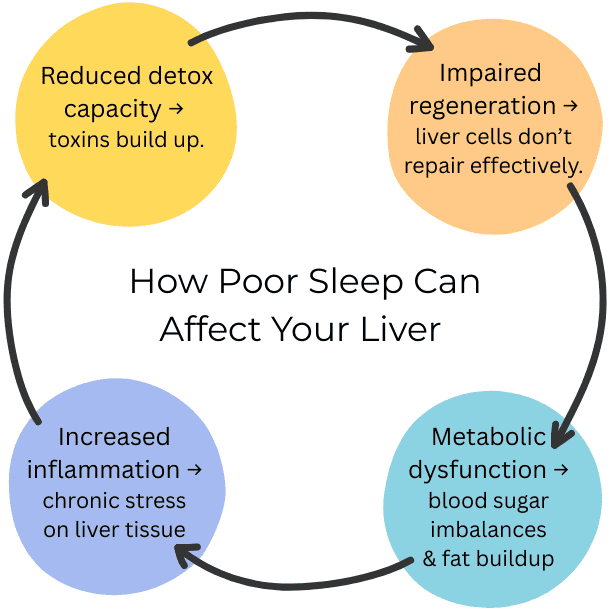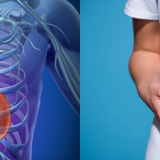

Sleep and Your Liver: Why Timing Matters
Sleep does more than refresh your mind, it also governs vital processes in your liver. The liver follows its own internal clock, timing detoxification and repair to align with your nightly rest. Just like you follow a daily rhythm, your liver operates on a circadian clock—a 24-hour cycle that determines when it performs different functions. Understanding this rhythm can open up new ways to support liver health and overall well-being.
Your liver doesn’t work at the same level all day long. Instead, it times its most critical tasks to match your body’s natural sleep-wake cycle. When that rhythm is disrupted, so is your liver’s ability to detoxify and regenerate.
And nighttime is prime time for your liver.
- 10 PM – 2 AM: Peak Detoxification. Detox enzymes are most active, clearing out toxins accumulated during the day.
- 2 AM – 6 AM: Regeneration mode, during which liver cells repair and renew themselves.
- During the night, the liver also balances blood sugar and fat metabolism.
- Critical proteins for liver function are produced while you sleep deeply.
Without proper rest, these essential nighttime tasks are cut short.
What Happens When Sleep Goes Wrong
Poor sleep or irregular patterns throw off your liver’s internal clock. The consequences can be serious:

In other words, when your sleep suffers, so does your liver.
The Science of Liver Chronobiology (Full 24-Hour Cycle)
Research in chronobiology—the study of the body’s internal clocks—shows that the liver follows a highly structured 24-hour rhythm. Different functions dominate depending on the time of day:
Morning (6 AM – Noon):
- Releases stored glucose (glycogen) to fuel your body after the overnight fast.
- Processes morning hormones like cortisol, which peaks early in the day to boost alertness and energy.
- Begins metabolizing proteins and nutrients from breakfast.
Afternoon (Noon – 6 PM):
-
- Peaks in bile production, supporting digestion of dietary fats.
- Handles nutrient metabolism (carbohydrates, fats, and proteins) from daytime meals.
- Performs steady detoxification of caffeine, food residues, and medications.
Evening (6 PM – 10 PM):
- Shifts into “prep mode” for nighttime work, activating detox-related enzymes.
- Balances blood sugar as evening eating winds down.
Helps regulate hormones like insulin and melatonin, signaling the body to prepare for sleep.
Nighttime (10 PM – 2 AM): Peak Detoxification
- Detox enzymes are at their highest activity, clearing out toxins accumulated during the day.
- The liver processes alcohol, medications, environmental chemicals, and metabolic byproducts most efficiently during this window.
Late Night (2 AM – 6 AM): Regeneration and Repair
- Liver cells repair and renew themselves, helping maintain long-term organ function.
- Blood sugar and fat metabolism are reset for the next day.
- Critical proteins required for liver and whole-body health are synthesized during deep sleep.
This cycle reinforces why sleep quality—and timing—matters.
What the Research Shows (and What It Doesn’t)
Research published in The Journal of Hepatology and Gastroenterology confirms that the liver’s metabolic, detoxification, and repair functions follow strong circadian rhythms, with distinct peaks during the rest/fasting phase of the day–night cycle.¹˒² While these studies do not assign exact clock times, they describe two primary activity peaks—one at the end of the light phase and another at the end of the dark phase—corresponding to detoxification and repair. To translate these findings into human sleep–wake schedules, many integrative health models map these functions onto the windows of approximately 10 PM–2 AM (detoxification) and 2 AM–6 AM (cellular repair and regeneration). This time-of-day framework should therefore be understood as an interpretation of circadian biology, not a literal statement from the primary literature.
Optimizing Your Liver’s Clock
The good news: you can help your liver perform optimally by improving your sleep habits and circadian health.
Sleep Timing
- Aim for bed by 10–11 PM to align with peak detox hours.
- Stick to consistent sleep/wake times to strengthen your rhythm.
- Prioritize 7–9 hours of quality sleep each night.
Sleep Quality Enhancers
- Sleep in a dark, cool room (65–68°F).
- Avoid screens 2 hours before bed—blue light disrupts circadian signals.
- Skip late meals so your liver isn’t digesting when it should be detoxing.
Circadian Support Nutrients
- Melatonin – Regulates sleep-wake cycles.
- Magnesium – Encourages deeper, restorative sleep.
- L-Theanine & GABA – Promote calm and relaxation.
Liver-Specific Sleep Support
- Milk Thistle – Protects liver cells during detox.
- NAC (N-Acetyl Cysteine) – Boosts glutathione for detoxification.
- B-Complex – Supports energy metabolism and circadian balance.
Lifestyle Strategies
- Morning light exposure to reset your internal clock.
- Bedtime routine to signal your body (and liver) it’s time to rest.
- Stress management to avoid cortisol-related sleep and liver disruption.
- Regular exercise to enhance sleep and liver metabolism—just not right before bed.
Liver-Smart Sleep Tips
Want to give your liver the best environment to do its work? Try these simple strategies:
- Head to bed by 10–11 PM to align with your liver’s detox window.
- Stick to a schedule—your liver thrives on consistency.
- Keep it cool and dark—ideal sleep temp is 65–68°F.
- Skip late-night meals so your liver can focus on detox, not digestion.
- Wind down naturally—dim lights and avoid screens before bed.
- Get morning sunlight to reset your circadian clock.
Supporting your sleep means supporting your liver.
The Bottom Line
Your liver depends on sleep as much as your brain and body do. By honoring your liver’s internal clock, you support more effective detoxification, better metabolic balance, and healthier cellular repair.
Prioritizing consistent, high-quality sleep gives your liver the environment it needs to detoxify, repair, and regulate metabolism—helping you stay healthy from the inside out.




